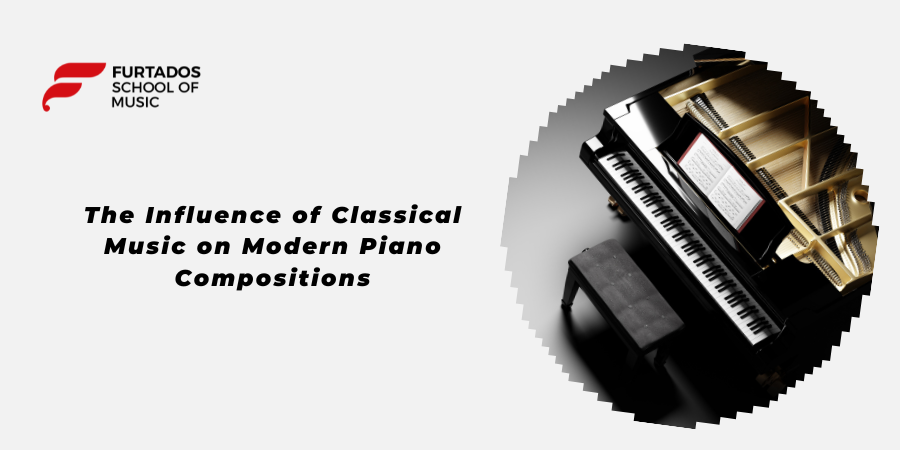The world of piano music is a tapestry woven with threads from various musical genres and time periods. Classical music, with its rich heritage and timeless compositions, has had a profound influence on modern piano compositions. As you explore the piano’s expressive possibilities through piano classes and piano lessons at Furtados School of Music, it’s essential to recognize the enduring impact of classical music on contemporary piano pieces.
A Foundation of Technique and Theory
Classical piano music, characterized by composers like Mozart, Beethoven, and Chopin, serves as the foundation upon which modern piano compositions are built. The technical demands, intricate phrasing, and harmonic complexity found in classical pieces have shaped the skills required of today’s pianists.
Structural Mastery
Classical compositions often adhere to established structures, such as sonata-allegro form, ternary form, and rondo form. These structural conventions have left an indelible mark on modern piano compositions, providing a framework for organizing musical ideas and creating coherence in a piece.
Harmonic Innovation
Classical composers pushed the boundaries of harmony, introducing dissonance and chromaticism to create emotional depth and tension. These harmonic innovations continue to influence contemporary piano music, adding color and complexity to compositions.
Expressive Techniques
The expressive techniques developed by classical pianists are integral to modern piano compositions. Techniques such as rubato (tempo flexibility), dynamic contrast, and careful use of pedal are essential tools for conveying emotion and nuance in both classical and modern pieces.
Melodic Inspiration
Classical melodies are celebrated for their beauty and lyrical qualities. Modern composers often draw inspiration from these melodies, incorporating memorable and evocative tunes into their own compositions.
Blurring Genre Boundaries
Contemporary piano compositions frequently blur the lines between classical, jazz, and other genres. This fusion of styles, known as crossover or neo-classical music, allows pianists to explore a diverse range of influences while preserving the timeless elegance of classical piano.
Minimalism and Repetition
Minimalist composers like Philip Glass and Steve Reich have had a profound impact on modern piano music. Their use of repetitive patterns and gradual harmonic shifts has found its way into contemporary piano compositions, offering a fresh perspective on structure and rhythm.
Incorporating Folk and World Music
Many modern piano compositions incorporate elements of folk and world music, expanding the piano’s sonic palette. By integrating rhythms, scales, and melodies from different cultures, pianists create unique and captivating pieces that resonate with global audiences.
Technological Advancements
Advancements in technology have also played a role in the evolution of piano music. Electronic instruments, synthesizers, and digital effects have opened new avenues for creative expression, enabling pianists to experiment with soundscapes and textures in their compositions.
The Personal Touch
While classical music serves as a wellspring of inspiration, modern piano compositions often reflect the individuality and experiences of contemporary composers. These compositions are a canvas for personal expression, allowing pianists to infuse their unique stories, emotions, and perspectives into their music.
Conclusion: A Continuum of Musical Tradition
As you embark on your piano journey at Furtados School of Music, it’s essential to recognize the interplay between classical and modern piano music. Classical compositions serve as both a foundation and a source of inspiration, enriching the repertoire of pianists with their technical demands and emotional depth. Meanwhile, modern piano compositions continue to push boundaries, incorporating diverse influences and personal narratives.
Ultimately, the relationship between classical and modern piano music is a testament to the enduring power of the piano as an instrument of boundless creativity and expression. Whether you are drawn to the timeless elegance of classical compositions or the innovative spirit of modern pieces, the piano offers a world of musical exploration and discovery.
